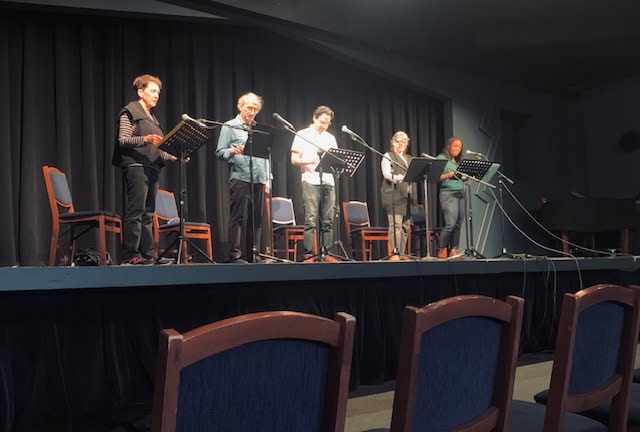Based on Sinclair Lewis’ 1935 novel, the play “It Can’t Happen Here” comments on the rise of fascism in the American government. When the play first opened in 1936, 21 theaters across the country showed it on the same day. In recognition of Lewis and this play, the Writers for Democratic Action created “It Can’t Happen Here — Again” to reflect on the current state of the world and to issue a call of action: Vote.
The Writers for Democratic Action is an organization dedicated to the pursuit of democracy and civil liberty. It was created in 2020 as a small group of writers, but it has grown to a worldwide platform. In July, it showed “It Can’t Happen Here — Again” in 91 locations across nearly as many cities. This past weekend, on Oct. 27, nearly 30 more productions took place, including one at the Palace Theater in Hamilton, NY.
The play was read by five speakers, many of which were Colgate University professors. In line with the tumultuous themes of the play, each speaker jumped from line to line, voices staccato and full of emotion, and they often interrupted each other or spoke all as one. The audience was silent aside from small gasps or surreal laughter; even then, they quickly quieted as the anger, grief and hope expressed in each line swept over them.
The reading was followed by a gripping discussion about the upcoming election and the consequences it may have on the country. Members of the local community attended, including concerned voters, Colgate students and others who work with either the New York State Democratic Party or particular Senate candidates.
James Meyers, a Democratic candidate for New York State Senate District 53, was represented in the audience by Sean Mahoney, his campaign manager. Mahoney was one of the first to speak up during the discussion by introducing himself and urging the audience to take action. Whether that means going door-to-door to provide election information, working with polling offices to gauge voter opinions or just voting, it is everyone’s democratic responsibility to participate.
When concerns about the possibility of young people and moderates not voting, or voting for one candidate out of spite, arose, one overarching opinion that emerged was that it’s important to consider the people endangered by political decisions when voting.
Voting was proposed as a moral responsibility, more than a purely democratic or political one, by the crowd. If someone doesn’t vote, it reflects a lack of care. However, as negatively as nonvoters are viewed on both sides of the political spectrum, there may be more to their decision.
“Everything is so polarized,” remarked Hannah Holt, a sophomore at Colgate University. “There’s this fear of offending people. And I get it, sometimes it’s not the right time, or people feel like it’s not the right moment to talk about things, but I don’t feel like we should not talk about them forever. If you don’t talk, no one knows anything.”
Many of the questions asked after “It Can’t Happen Here — Again” followed this train of thought. How do we convince people to vote? How do we keep people informed? How should the safety of strangers play into my own voting decisions? There weren’t many straightforward answers, but Javier Padilla Rios, associate professor of English, who read at the event, stated that perhaps the most important thing is to simply be aware of what is going on.
“The play was an important opportunity to remind ourselves of the dangers of creeping fascism. I was happy to collaborate with [Professor of English Peter Balakian] and his organization, Writers for Democratic Action, who organized similar readings around the country. The conversation at the end of the reading was particularly insightful. The audience brought up crucial issues, like the war in Gaza and its effects on the elections.”
For Professor Emerita of Anthropology and Peace & Conflict Studies Nancy Ries, reading at the event was a chance to voice caution about the threat of fascism posed by former President Donald Trump. Ries is familiar with the USSR and Russia’s strategies to shut down independent expression and threaten the rights of groups, and the violence that these movements led to.
“Because of this personal and professional experience watching as political extremism overtook Russia, what Trump threatens for the United States feels profoundly real to me,” Ries said. “I know how extremist regimes work, and what we all will lose if Trump comes to power again. ‘It Can’t Happen Here — Again’ captures the practices and processes of fascism very vividly and conveys the absolute imperative to stop the violence of fascism by voting.”
An emphasis on voting was repeated by every speaker and every audience member at some point, either during the play reading, in the discussion or as people were talking on their way out. Broken down to their simplest themes, that’s what Lewis’ novel and “It Can’t Happen Here — Again” suggest: Acknowledge fascism, fight against it and fight for democracy. The first step is voting.
















